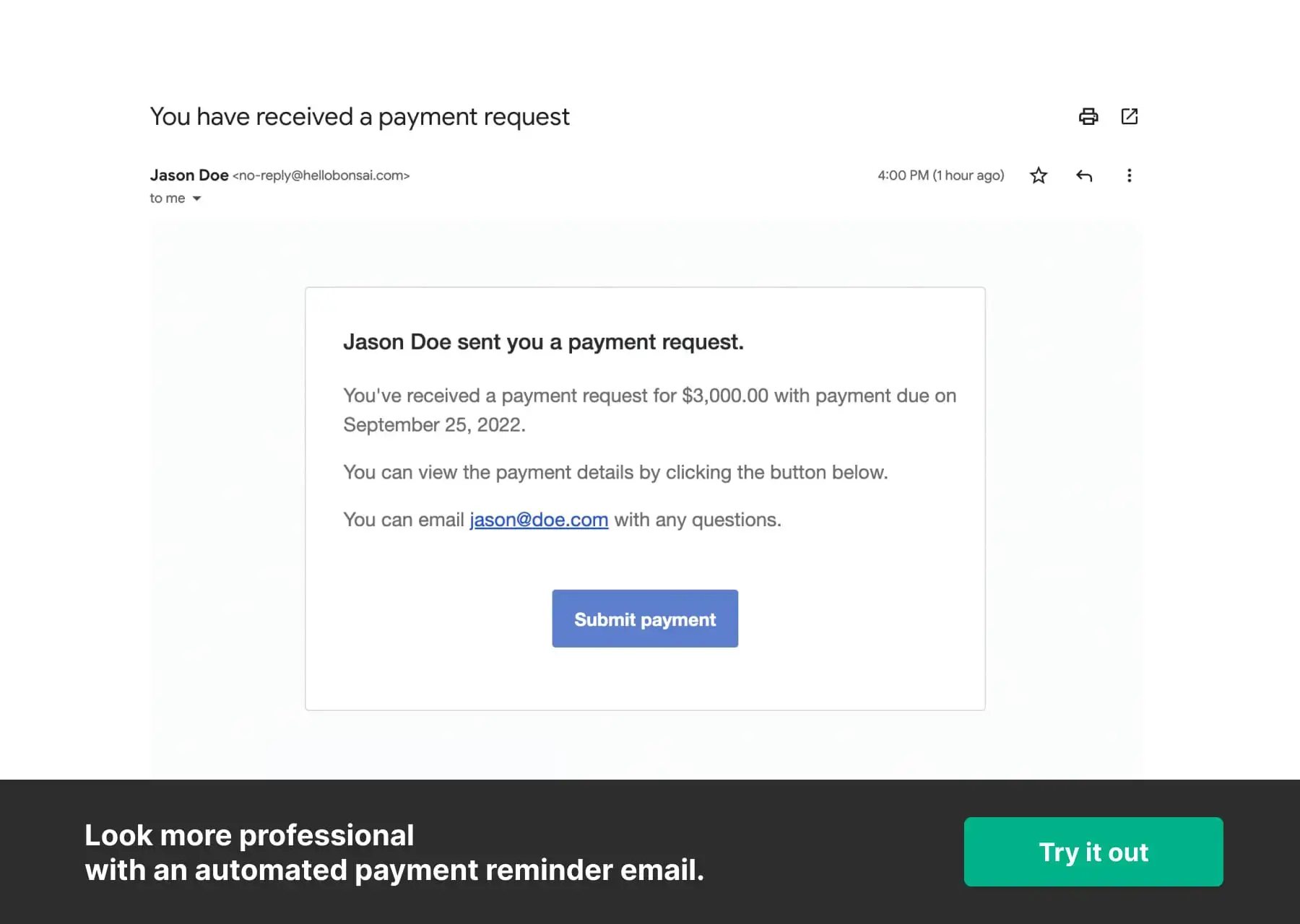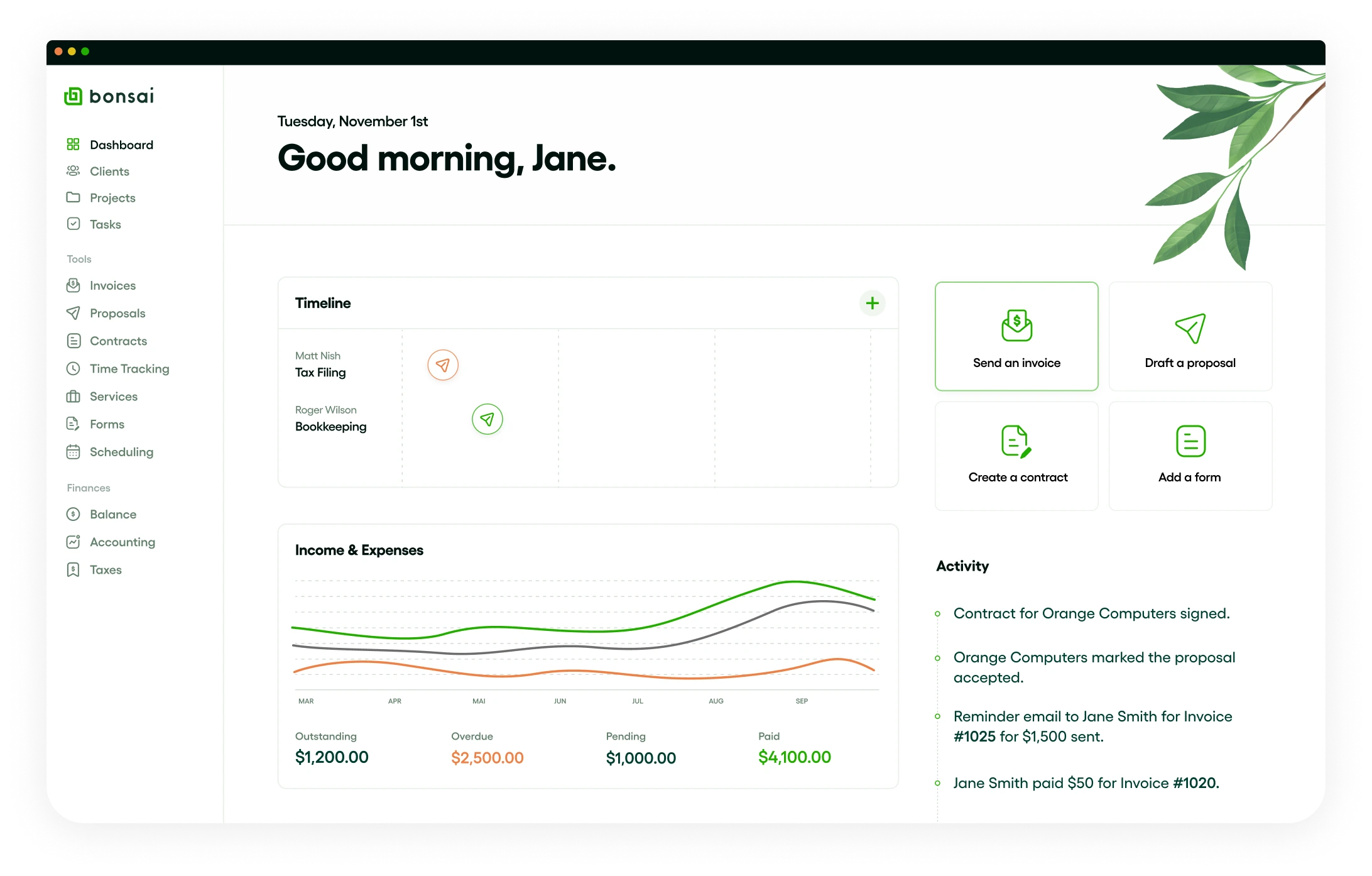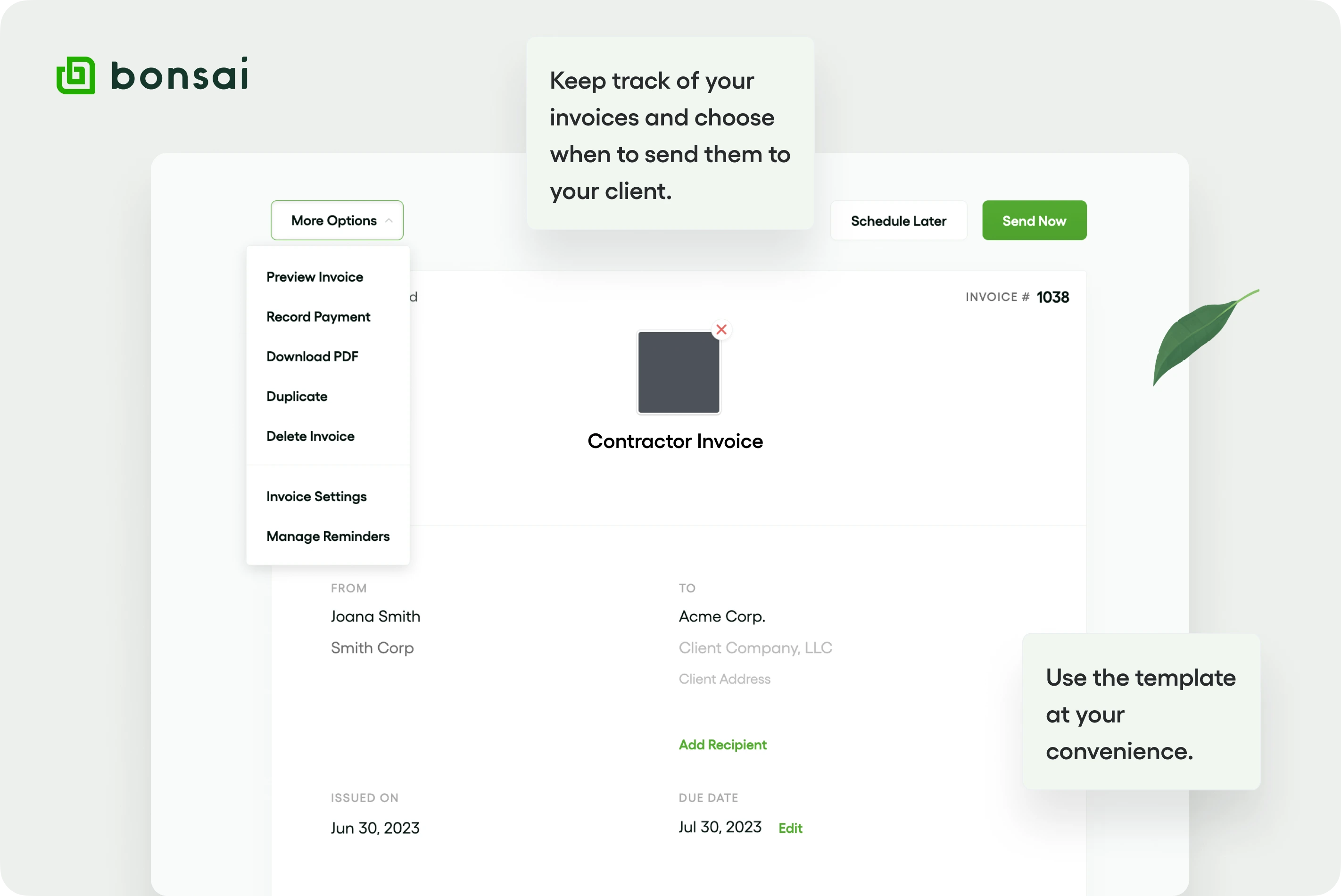Para redactar un correo electrónico solicitando un pago, comience dirigiéndose al cliente de forma educada y exponiendo claramente el motivo del correo. Utilice un tono profesional e incluya todos los detalles necesarios, como el número de factura, el importe adeudado y la fecha de vencimiento. Ofrecer múltiples opciones de pago puede facilitar pagos más rápidos. Si el pago está atrasado, puede ser útil enviar un recordatorio amable de los términos acordados. El uso de plantillas de correo electrónico puede agilizar el proceso, garantizando la coherencia y la profesionalidad. Recuerde que una comunicación clara y la cortesía son fundamentales para mantener buenas relaciones con los clientes y garantizar pagos puntuales.
Especialmente si acabas de empezar tu carrera como autónomo, saber cómo solicitar el pago por correo electrónico a un cliente puede resultar un poco abrumador. Lidiar con el aspecto financiero puede incluso parecerle totalmente antinatural, sobre todo si está acostumbrado a recibir un sueldo mensual y seguir con su vida sin tener que pedir que le paguen por una plantilla de factura.
Aprender el protocolo adecuado para enviar correos electrónicos como autónomo, desde responder con rapidez hasta utilizar saludos personales, te ayudará a parecer más profesional y a establecer una relación más sólida y duradera con los clientes (lo cual es muy beneficioso para tus resultados). Sin embargo, hay un tipo especial de etiqueta que entra en juego cuando se solicita un pago por correo electrónico.
Tanto si se trata de tu primera factura como autónomo como si estás lidiando con un cliente moroso, es importante saber cómo solicitar el pago de forma profesional y educada. A continuación, te indicamos algunos aspectos que debes tener en cuenta al enviar un correo electrónico de solicitud de pago a tu cliente.
1. Cómo pedirle a un cliente que pague de forma educada
Saber cómo solicitar un pago por correo electrónico de manera profesional —de hecho, saber cómo redactar correos electrónicos profesionales en general— es una de las habilidades más importantes que puedes aprender como consultor o autónomo. Cuando solicite el pago, no debe parecer amenazante ni agresivo, pero debe mostrarse firme y claro.
Pero no se preocupe, hemos compartido las 5 plantillas que han tenido éxito durante años para enviar recordatorios de pago amables a los clientes. Sigue leyendo.
Para solicitar amablemente el pago a tu cliente, asegúrate de que tu mensaje sea cordial y amistoso. Piensa en la forma en que te has comunicado con ellos hasta ahora. No querrás que ese tono o esa relación cambien de repente solo porque haya un pago de por medio.
Mantén siempre abiertas las líneas de comunicación. Anime a sus clientes a ponerse en contacto con usted si tienen alguna pregunta o duda, y siempre insinúe que le gustaría volver a trabajar juntos en el futuro.

2. Cómo conseguir que un cliente pague una factura
Los cheques y los faxes son cosa del pasado. Enviar una factura freelance a tu cliente por correo electrónico le demuestra que eres un profesional… y que no trabajas como en la Edad de Piedra. Además, les facilita mucho el pago y (por suerte para ti) te ayuda a garantizar que te paguen rápidamente.
Aunque siempre puedes crear tu factura tú mismo y enviarla como archivo adjunto, existen soluciones mucho más sencillas. El mejor software de contabilidad y fiscalidad te permite crear y enviar facturas por correo electrónico con solo pulsar un botón.
Por ejemplo, con Bonsai, solo tienes que ir a tu panel de control y hacer clic en «Enviar una factura».

A continuación, deberá seleccionar (o crear) su cliente, proyecto y elegir un tipo de factura.


Una vez que haga clic en «crear factura», accederá a la página de plantillas de facturas. Personalízalo según tus necesidades, comprueba que todo esté correcto y haz clic en «enviar ahora» para solicitar el pago por correo electrónico.
Si te interesa probar estas soluciones tan sencillas por ti mismo, puedes registrarte para obtener una prueba gratuita de Bonsai, sin compromiso alguno. También puedes seguir nuestra guía completa sobre cómo hacer una factura.
Además de utilizar estas herramientas de facturación, aquí tienes algunos consejos para saber cómo solicitar el pago por correo electrónico.
2.1. Utiliza un script.
Si eres un profesional independiente ocupado y exitoso, es probable que realices múltiples solicitudes de pago cada mes (¡quizás incluso varias por semana!). Por ese motivo, podría resultarle útil tener a mano un modelo de correo electrónico al que pueda recurrir cada vez que desee enviar un correo electrónico de solicitud de pago a su cliente.
Tu guion debe personalizarse para cada cliente y proyecto, pero, en general, recuerda incluir un asunto que mencione claramente la solicitud de pago y asegúrate de indicar claramente el importe adeudado con los detalles del pago. Los entrenadores son algunos de los mejores a la hora de recordar esto de forma amable pero eficaz. Aquí tienes algunas plantillas de correo electrónico para coaching que realmente funcionan.
Aquí tienes un ejemplo de guion que puedes utilizar cuando solicites un pago por correo electrónico:
Asunto: Pago por [detalles del proyecto]
Hola, [nombre del cliente]:
Me gustaría reiterar lo mucho que disfruté trabajando juntos en [proyecto]. Disfruté mucho del proceso y fue un placer trabajar con ustedes.
Adjunto una factura por el proyecto con el importe acordado de [importe de la factura]. Puede pagar [información sobre las opciones de pago]. Tenga en cuenta que, tal y como se ha acordado, el pago deberá efectuarse en un plazo de [número] días a partir de la recepción de la factura.
Si tiene alguna pregunta, no dude en preguntar.
Gracias de nuevo, y espero poder volver a trabajar juntos en el futuro.
[Firma preferida],
[Tu nombre]
Además del ejemplo anterior, también compartimos las 5 plantillas en las que puedes confiar para que te paguen a tiempo.
e 2.2. Redacta una factura clara.
Al fin y al cabo, no importa lo amable o comprensible que sea tu correo electrónico: si tu factura no es clara, no te la pagarán. Averigua cómo redactar una factura por un trabajo freelance que sea clara, fácil de entender y coherente.
Al final del día, usted quiere asegurarse de que su factura describa el trabajo completado de una manera que incluso un tercero pueda entender. Después de todo, ¡la persona que paga tu factura como autónomo puede que no tenga nada que ver con el proyecto! Además, indique claramente su precio y no olvide incluir los impuestos o tasas pertinentes.
2.3. Envíalo a la persona adecuada.
Esto debería ser obvio, pero es fundamental asegurarse de enviar la factura a la persona adecuada. Puede que te sorprenda, pero este sigue siendo uno de los mayores errores de facturación que cometen los autónomos y consultores.
Asegúrate de preguntar a quién debe enviarse tu factura cuando firmes tu contrato como autónomo. Obtener esta información desde el principio puede ayudarle a evitar retrasos en los pagos o problemas de comunicación más adelante. La mejor práctica es utilizar siempre una plantilla de contrato sólida .

También puedes utilizar Bonsai para gestionar todos tus pagos. Preocúpate menos, cobra más rápido y dedica más tiempo a hacer el trabajo que te gusta: regístrate para obtener una prueba gratuita.
3. Cómo solicitar el pago de una factura vencida
Por muy educada y clara que sea tu solicitud de pago, siempre te encontrarás con clientes que no pagan a tiempo. Aunque eso puede resultar increíblemente frustrante, recuerda que tus clientes están ocupados. Es posible que tengan toda la intención de pagarte, pero que hayan extraviado tu correo electrónico o se hayan tomado unas vacaciones inesperadas.
Por encima de todo, es importante evitar las confrontaciones. Después de todo, querrás mantener tu relación con el cliente y evitar quemar puentes que podrían dar lugar a más trabajo, ya sea con el cliente en cuestión o a través de referencias.
Estos son algunos de los mejores consejos de Bonsaisobre cómo solicitar el pago de una factura vencida por correo electrónico.
3.1. Tome medidas para asegurarse de que le paguen a tiempo.
Como autónomo, probablemente siempre estés buscando trucos para que los clientes te paguen más rápido. Después de todo, cuanto más rápido te paguen, más rápido podrás pasar al siguiente proyecto y pagar tus propios honorarios y facturas. Por lo tanto, es importante tomar algunas medidas incluso antes de que el retraso en los pagos se convierta en un problema, para asegurarse de que se le pague a tiempo.
Sé muy claro con respecto a las condiciones de pago en tus contratos como autónomo, especialmente en lo que se refiere a los plazos. Intenta utilizar una plantilla de contrato para autónomos siempre que sea posible. Incluya la frecuencia con la que planea facturar a su cliente, el importe de cada factura (si se trata de un proyecto de precio fijo o a largo plazo) y el plazo de pago de la factura tras su recepción.
También puede considerar la posibilidad de incluir una tasa por demora en el pago u ofrecer incentivos por pagos rápidos, como descuentos, servicios o productos gratuitos, o incluso un complemento especial a los resultados de su proyecto.
3.2. Haga un seguimiento temprano.
No esperes a que tu factura venza para solicitar el pago. La mejor manera de conseguir que tu cliente pague una factura es enviarle un recordatorio rápido y amable aproximadamente una semana antes de la fecha de vencimiento. Tu cliente agradecerá el aviso, especialmente si cobras recargos por demora.
El software de facturación de Bonsai te permite configurar estos recordatorios automáticamente para que puedas centrarte en completar proyectos y dedicar menos tiempo a tu bandeja de entrada. Regístrate para obtener una prueba gratuita y compruébalos tú mismo.
3.3. Si eso no funciona, haz un seguimiento constante.
No espere hasta un mes después de la fecha de vencimiento de la factura para volver a hacer un seguimiento, cuando ya esté entrando en pánico por su flujo de caja. Si tu cliente se retrasa en el pago, envíale un correo electrónico recordándole el pago una semana después de la fecha de vencimiento, luego dos semanas después y, finalmente, un mes después.
En el correo electrónico de solicitud de pago al cliente, indique claramente el retraso de la factura y no olvide pedirle que se ponga en contacto con usted si tiene alguna pregunta o duda. Por muy frustrado que estés, es importante mantener abiertas las líneas de comunicación y evitar las confrontaciones. Una vez transcurrido un mes, considere métodos alternativos para ponerse en contacto con su cliente, como llamarle directamente.
Si nada funciona. También podría considerar obtener una declaración jurada de impago. Para obtener más información, lea este artículo sobre la declaración jurada de notificación.
Deja que los pagos lleguen.
Si sigues estos consejos sobre cómo solicitar el pago por correo electrónico, estarás en el buen camino para garantizar que tus clientes te paguen rápidamente, al tiempo que mantienes una excelente relación profesional con ellos. Para facilitarte aún más las cosas, considera automatizar tus pagos con el software para autónomos de Bonsai. Regístrese hoy mismo para obtener una prueba gratuita y compruebe por sí mismo las ventajas de trabajar como autónomo de forma automática.






